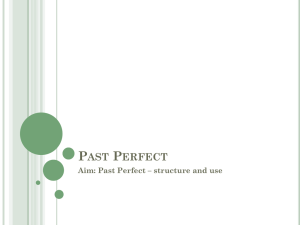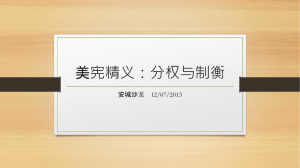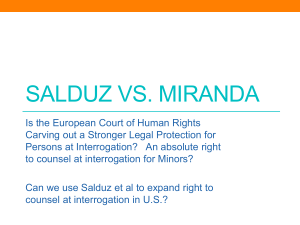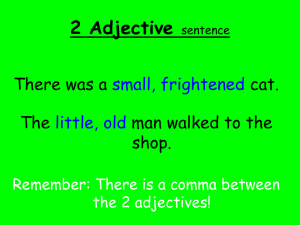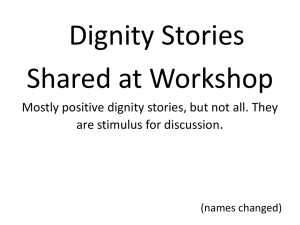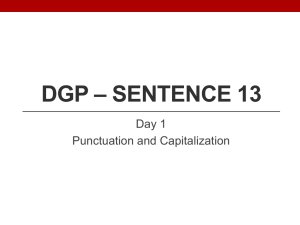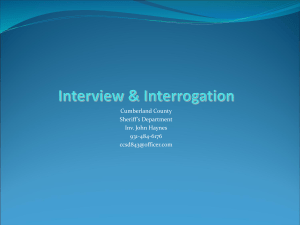The full document, PDF
advertisement
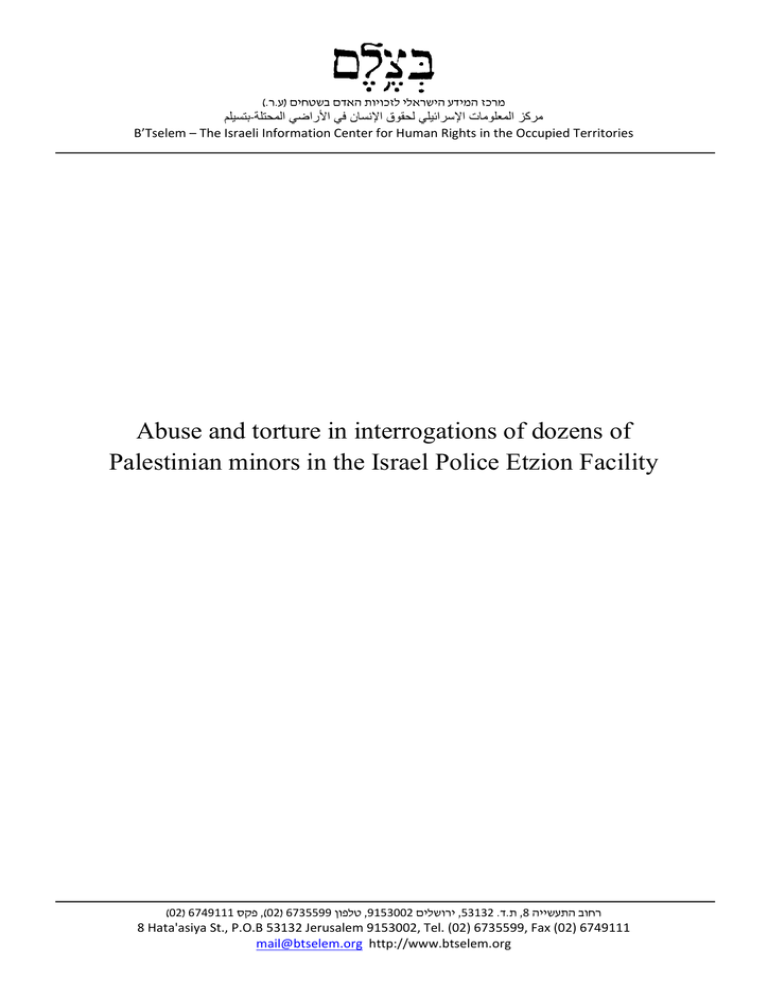
(.ר.מרכז המידע הישראלי לזכויות האדם בשטחים )ע مركز المعلومات اإلسرائيلي لحقوق اإلنسان في األراضي المحتلة‐بتسيلم B’Tselem – The Israeli Information Center for Human Rights in the Occupied Territories Abuse and torture in interrogations of dozens of Palestinian minors in the Israel Police Etzion Facility (02) 6749111 פקס,(02) 6735599 טלפון,9153002 ירושלים,53132 .ד. ת,8 רחוב התעשייה 8 Hata'asiya St., P.O.B 53132 Jerusalem 9153002, Tel. (02) 6735599, Fax (02) 6749111 mail@btselem.org http://www.btselem.org Overview Since November 2009, B’Tselem has received testimonies from dozens of Palestinian residents of the Bethlehem and Hebron districts, most of them minors, alleging that they were subjected to threats and violence, sometimes amounting to torture, during their interrogation at the police station at Gush Etzion. The station is located within the jurisdiction of the SHAI (Judea and Samaria) District of the Israel Police. The testimonies describe interrogations in which the minors were forced to confess to alleged offenses, mostly stone‐throwing. In almost all cases, the interrogators stopped using violence against the interrogatees once they confessed. The right of every person not to be subjected to ill‐treatment or torture (whether physical or mental) is one of the few human rights that are considered absolute. As an absolute right, it may never be "balanced" against other rights and values, nor suspended or limited, even in difficult circumstances such as war or fighting terrorism. This right now holds the highest and most binding status in international law. A confession obtained through violation of this right can certainly not serve as the basis for a conviction. The interrogations In November 2009, B'Tselem began receiving reports of violence against Palestinian minors during interrogation at the Etzion police station. Until July 2013, B'Tselem field researchers collected 64 testimonies from residents of eight communities in the southern West Bank who reported such incidents. Fifty‐six of them were minors at the time of their interrogation. The testimonies described severe physical violence during the interrogation or preliminary questioning, which, in some cases, amounted to torture. The violence included slaps, punches and kicks to all parts of the body, and blows with objects, such as a gun or a stick. Some of the former interrogatees also reported threats: in twelve cases, they claimed that the interrogator had threatened them or female relatives with sexual assault, such as rape and genital injury. In six cases, the interrogatees claimed that the interrogators had threatened to execute them; in eight cases, the interrogators allegedly threatened to harm family members; and in five other cases, they allegedly threatened to electrocute the interrogatees, including in a way that would damage their fertility. 2 In addition, twelve interrogatees stated that their initial confession had been taken by an interrogator in civilian clothes and that, to the best of their knowledge, at that stage, it had not been recorded. Only after they confessed to stone‐throwing, they were transferred to another room, where an interrogator in police uniform asked them to repeat their confession, this time recording them. Later, the interrogators told them to sign a document in Hebrew, a language they do not understand, without knowing what they were signing. The authorities' action on the issue From 2009 to 2013, B'Tselem sent 31 complaints to the Department for Investigation of Police (DIP) on behalf of Palestinians who reported they had been subjected to violence and threats by interrogators at the Etzion station. In the rest of the cases that B'Tselem documented, the interrogatees or their families chose not to file a complaint with the DIP, for fear that this would result in harm to members of the family who had already been interrogated or to other relatives, or because of a general lack of trust in the Israeli justice system. Of the 31 interogatees in whose name B'Tselem complained to the DIP, 20 eventually withdrew from their intention to file a formal complaint and give testimony to DIP investigators, for the reasons stated above. The DIP decided not to investigate any complaints in which the complainant had not personally testified before investigators. Based on replies given to B'Tselem, none of the information sent to the DIP regarding those cases was checked, although this could have helped investigate the systemic practice. The DIP only opened investigations into the eleven cases in which the complainants had personally given testimony. Three of the case files were closed and the investigation of eight, all opened in June 2012 or later, is still under way. In its correspondence with the DIP, B'Tselem demanded that the issue of violent interrogations at the Etzion station be handled systemically, and not just through the investigation of each individual complaint. B'Tselem representatives also presented this demand to officials in the Israel Police and the Ministry of Justice. The DIP replied that a systemic investigation of the matter was under way. Although B'Tselem contacted the Israel Police on this matter repeatedly, no official answer was given to the question whether any steps had been taken to address the phenomenon and, if so, what they were. All our communications with the police on the matter were met with denial. For example, in a meeting held on 7 January 2013, between B'Tselem representatives and the 3 commander of the Hebron Police Division, the police officials denied the phenomenon existed. They refused to comment on the complaints themselves, claiming they could not verify the details of the cases since they were under ongoing investigation by the DIP, and there was a concern of obstructing the investigation. At the meeting, B'Tselem was also informed that the interrogation officer at the Etzion station had been replaced, although it was emphasized that this was unrelated to the complaints made by B'Tselem. The high number of reports B'Tselem has received regarding violent interrogations at the Etzion station, and the fact that they span several years, gives rise to heavy suspicion that this is not a case of a single interrogator who chose to use illegal interrogation methods, but rather an entire apparatus that backs him up and allows such conduct to take place. Yet, to the best of B'Tselem's knowledge, no real effort has been made to date to discontinue the abuse, and no systemic investigation has taken place. The only action that has been taken was the investigation of individual complaints, which, more than a year later, have not concluded. Law enforcement agencies are allowing this reality to continue, despite the fact that all the relevant officials know that the claims relate to violence against minors under interrogation, and that, in some cases, the violence has amounted to torture. Given the severity and scope of the suspicions raised, the DIP and the Israel Police must examine the issue systemically. If the claims are substantiated, they must take immediate action to stop the illegal conduct and take legal and administrative measures against those responsible, including officials who are aware of this conduct and are allowing it to continue. Also, the existence of efficient oversight mechanisms must be ensured, so as to prevent similar cases in the future. The DIP must immediately conclude its investigation of the individual complaints, which has been under way for more than a year. If the claims are substantiated, those responsible must be brought to justice. Finally, if it is discovered that forced confessions have served as central evidence in the trials of the interrogatees or other individuals, mistrials must be declared, and all the necessary steps that follow as a result must be taken. 4 Excerpts from testimonies The testimonies were collected by B’Tselem field researchers Suha Zeid, Musa Abu Hashhash and Manal al‐Ja’bari. Excerpts follow. “The interrogator made me go into a room. He grabbed my head and started banging it against the wall. Then he punched me, slapped me and kicked my legs. The pain was immense, and I felt like I couldn’t stand any longer. Then he started swearing at me. He said filthy things about me and about my mother. He threatened to rape me, or perform sexual acts on me, if I didn’t confess to throwing stones. His threats really scared me, because he was very cruel and it was just the two of us in the room. I remembered what I’d seen on the news, when British and American soldiers raped and took photos of naked Iraqis.” (M.H., 14, resident of Husan) M.H., a resident of Husan, was 14 when he was arrested in November 2009. In his testimony to B’Tselem, he described the interrogation he underwent: “The interrogator wore civilian clothes. He introduced himself as “Abu Daud”. He made me go into a room. He asked me whether I’d thrown stones and when I said that I hadn’t, he grabbed my head and started banging it against the wall. Then he punched me, slapped me and kicked my legs. The pain was immense, and I felt like I couldn’t stand any longer. Then he started swearing at me. He said filthy things about me and about my mother. He threatened to rape me, or perform sexual acts on me, if I didn’t confess to throwing stones. His threats really scared me, because he was very cruel and it was just the two of us in the room. I remembered what I’d seen on the news, when British and American soldiers raped and took photos of naked Iraqis. I threw myself down on the floor and shouted that I hadn’t done anything and that I hadn’t thrown a single stone. The interrogator told me to stand up and I had to do it, even though my legs really hurt. He took me to another room. He wrote something on his computer and then I heard him talking on the phone with someone. He told him: “Come and get your son”. I understood that it was my father. About half an hour later, my father got there and signed a guarantee that I wouldn’t do anything. Then he took me home. For two days, I lay in bed and my whole body ached. Mostly, my head, shoulders and legs hurt. I couldn’t walk and had a limp.” Three days after the arrest, M. was arrested again. An army patrol came to his home in the middle of the night, arrested him and took him, again, to the Etzion police station. In his testimony, M. described the second interrogation he underwent: 5 “The soldiers made me go into a room. There were two interrogators in it. One was the interrogator who had interrogated me the previous time, “Abu Daud”, and I didn’t know the other one. “Abu Daud” said: “I sent you home, and then I discovered that you had lied to me.” The other interrogator took me out to the yard and started slapping me and hitting me in the head. He kicked me hard in the legs and then grabbed me by my shirt and threw me down to the floor. I felt as if all my bones were broken. Then he went away and left me outside for a long time. I think it was several hours.” M.H. was released on bail the next day, with no further proceedings. He gave testimony to the DIP, as part of an investigation opened into the incident following a complaint lodged by B’Tselem. The case was closed on grounds of absence of guilt. “The interrogator left the room and came back holding jumper cables. He attached two clamps to my hands and put a third clamp between my legs, near my genitals. He threatened to turn on the electricity unless I confessed. He said that if he turned on the electricity, I wouldn’t be able to have children.” (I.M., 15, resident of Beit Ummar) I.M., a resident of Beit Ummar, was 15 years old at the time of his arrest in May 2010: “The interrogator made me go into a small room. He told me to sit on my knees, facing the wall. He introduced himself as “Abu Zaki”. He asked me whether I wanted to go home, and I said that I did. He said that, if that was the case, I had to answer all his questions. I agreed. The interrogator asked me why I had thrown stones at soldiers, and I said that I hadn’t. He said that I was getting off to a bad start with the interrogation and asked why I was doing it. I answered that I was telling the truth. The interrogator asked me who organizes the demonstrations in the village and I said I didn’t know. He got angry. He said that obviously I didn’t want to go home and see my little two‐year‐old brother, Anas. He said that he knew I loved my brother, who was crying now and waiting for me to come back. He said, again, that he would release me if I cooperated. I answered that I had nothing to tell him. The interrogator came up to me from behind and put his knees on the plastic cable ties that were on my hands. He started putting pressure on my hands and pulled my head back. It really hurt. While he was doing that, he said: “I’m Abu Zaki and I’m crazy.” He kept pushing down on my hands, and then 6 he stopped. He said he was going out of the room for two minutes, and that I’d better tell him everything when he got back. When the interrogator came back to the room, he said: “Do you want to go home or make me take it up a notch?” I answered that I had nothing to say. The interrogator got angry. He came up to me and kicked me hard in the back. I shouted in pain. He said that he was taking it up to the next level. I told him that he could skip to level ten. He grabbed my jaw and told me not to talk until he asked me something. The interrogator put his leg on the cable ties that were around my wrists and started pressing down. As he was doing that, he asked me if I wanted to confess. The pain was terrible. He stopped and asked me, again, if I wanted to confess. I answered that I had nothing to say. The interrogator left the room and came back holding jumper cables. He attached two clamps to my hands and put a third clamp between my legs, near my genitals. He threatened to turn on the electricity unless I confessed. He said that if he turned on the electricity, I wouldn’t be able to have children. I answered that I wasn’t afraid. The interrogator was furious. He released the clamps, threw the cable on the floor and started kicking me in the back and hips. He stopped hitting me and threatened to continue unless I confessed. I decided to end it. I was scared that if I didn’t confess, he would keep on torturing me. I hadn’t thrown stones but I said that yes, I’d thrown stones on soldiers. I said I’d thrown stones two years before. The interrogator got angry and said he didn’t believe me, so I said that I’d thrown stones about two weeks before. Then the interrogation ended.” I.M. was released on bail five days later, with no further proceedings. He gave testimony to the DIP, as part of an investigation opened following a complaint filed by B’Tselem. The DIP file was closed on grounds of lack of evidence. “[T]he interrogator “Daud” took me outside with a soldier. They blindfolded me. The plastic cable ties were still on my hands. They put me in a car and started driving. I don’t know where they took me. We reached some place outside Etzion and they forced me out of the car. My hands really hurt because of the cable ties. They took off my blindfold. I didn’t know where I was. They tied me to a tree, and then they raised my cuffed hands and tied them to the tree, too. It hurt a lot. 7 “Daud” started punching me. After a few minutes, he took out a gun and said: “I’ll murder you if you don’t confess! Out here, no one will find you. We’ll kill you and leave you here” (M.A., 15, resident of Husan) M.A., a resident of Husan, was 15 years old at the time of his arrest in June 2011: “They put me in a room with two interrogators. Only one of them told me his name. He said it was “Daud”. He said that another kid from my village, who had been arrested a month before, said that I’d thrown stones. I said I hadn’t done anything, and both interrogators started punching me in the face and stomach. They kicked me really hard and hurt me a lot, in my legs and back and in my stomach area. That hurt particularly because I’d had a hernia operation there at the beginning of the month. The interrogators asked me whether I’d thrown stones. When I said I hadn’t, they punched me and kicked me. The interrogator called “Daud” was especially violent. He punched me hard. After a while, the interrogator “Daud” took me outside with a soldier. They blindfolded me. The plastic cable ties were still on my hands. They put me in a car and started driving. I don’t know where they took me. We reached some place outside Etzion and they forced me out of the car. My hands really hurt because of the cable ties. They took off my blindfold. I didn’t know where I was. They tied me to a tree, and then they raised my cuffed hands and tied them to the tree, too. It hurt a lot. “Daud” started punching me. After a few minutes, he took out a gun and said: “I’ll murder you if you don’t confess! Out here, no one will find you. We’ll kill you and leave you here.” He kept on punching me and interrogating me and hitting me. Then, he cut the cable ties on my hands, which were tied to the tree, and put the blindfold back on. They put me in the car and took me back to Etzion, for more interrogation. The same interrogator, “Daud”, interrogated me again. He hit me again, but this time it was different. He picked me up and pushed me against the wall. Every time I fell down, he kicked me. I felt like I was going to pass out from pain. I don’t know how long I was like that. Then, another interrogator came into the room. He hit me too, together with “Daud”. They punched me in the face and stepped on me every time I fell down. It went on like that until morning. In the morning, when the interrogation was over, they dragged me out of the room because I couldn’t stand up, and threw me into another room where there were seven other detainees. O., another kid 8 from my village, was there. He was even worse off than I was. His eyes were swollen and he had marks on his arms and legs from being beaten. O. told me that the interrogators had beat him up really bad in the interrogation room. He said he’d passed out a few times and that, in the end, he’d had to admit to throwing stones. We were both in a lot of pain, and sometimes we cried out, it was so bad. We were in the same room together at Etzion for four days, until we were transferred to Ofer Prison.” M.A. was released on bail five days later. The legal proceedings against him are still under way. M.B., a resident of Beit Ummar, was 17 when he was arrested and interrogated in October 2011: “There were two interrogators in the room. I was standing with my hands cuffed and my eyes covered. The interrogators asked me about an incident that had happened in Beit Ummar and whether I’d thrown stones in it. I said that I hadn’t thrown stones and that I hadn’t even been there. Suddenly one of the interrogators grabbed my arms, which were cuffed behind me. He lifted them up forcefully, and it really hurt. The other interrogator kneed me hard in my chest and I fell down. While I was lying on the floor, the two interrogators kicked me in the stomach and legs. I was very scared but I didn’t cry. Then a third interrogator came into the room. He accused me of trying to kill a soldier by throwing a stone during the incident they’d been asking me about. I said, again, that I hadn’t even been there. I asked him to take off my blindfold so that I could see him and speak to him. He took off my blindfold and untied my hands. l saw that my hands had turned blue because they had been cuffed so tight. The new interrogator sat me down on a chair. The other two interrogators stayed in the room. He asked me a few questions and then he blindfolded me and cuffed my hands again. He ordered me to stand up and kept asking me the same questions. When I answered, again, that I hadn’t been at that incident, the interrogator got angry. He kicked me and knocked me to the floor. He grabbed my forehead and began pressing hard. It hurt a lot and I started to scream. At some point, I couldn’t stand it anymore and I said, “I threw stones.” He then let go of me and took me to another room, where he took off my blindfold and untied my hands. I sat across from a policeman in uniform who wrote down my testimony. I confessed to 9 having thrown stones. He told me to sign the testimony but I refused because it was written in Hebrew and I did not know what was written or what I was signing.” Following his confession, M.B. was tried and released on bail after being held in custody for about a month. During his trial, his lawyers argued that M.B.’s confession was inadmissible since it had been forced out of him. As a result, the prosecution withdrew the indictment. The prosecution’s notice regarding the cancellation of the indictment made no reference to the arguments on admissibility or to the reason for the decision. “The two men who were with the interrogator took me out of the room and pushed me into the bathroom. The interrogator ordered me to get down on my knees. He pushed something into my mouth so no one would hear me screaming and began to punch me and slap me on my face and head. I started bleeding from my nose and mouth. The interrogator stood behind me, grabbed the cable ties on my hands and tightened them as much as possible. I could feel that the cuffs were making me bleed. He swore at me and said, while he was standing behind me: “I fuck children!” [...] I shouted at him: “Don’t touch me. Get away from me, I have nothing to confess.” That only made him angrier and he kept on hitting me.” (M.S., 16, resident of al‐‘Arrub) M.S., a resident of al‐’Arrub refugee camp, was 16 years old at the time of his arrest and interrogation in January 2011: “The first interrogator who interrogated me wore a police uniform. At the beginning of the interrogation, he treated me gently, with respect, and offered me coffee and cigarettes. He told me that other guys had said in interrogation that I’d thrown stones, so I’d better cooperate and confess. I said I had nothing to confess. The interrogator got angry. He yelled and cursed me and my mother and Islam. He said again that I had to confess, and I answered that I had nothing to confess. The interrogator phoned someone and, after a few minutes, an interrogator in civilian clothes came into the room with two other people who looked strong and scary. They didn’t interfere with the interrogation, but stayed in the room. The interrogator who was in civilian clothes said his name was “Daud”. He took me into another interrogation room, where he cuffed my hands behind my back and blindfolded me. He asked if I wanted to be interrogated the donkey way or the respectful way. I said I wanted the respectful way. He said: “So start talking.” 10 I told him that I had nothing to say. He asked me again and I answered again that I had nothing to say. “Daud” made me stand up and said: “Think again.” I answered that I had nothing to say. He cut the cable ties off my hands and took off my blindfold. Then, he ordered me to take all my clothes off. I asked him: “Why should I take my clothes off?” He answered: “Body search.” I took all my clothes off except my shoes. He told me to turn around and then told me to get dressed. After I got dressed, “Daud” asked: “Well?” I told him I had nothing to say. He handcuffed me again. The two men who were with him took me out of the room and pushed me into the bathroom. “Daud” ordered me to get down on my knees. He pushed something into my mouth so no one would hear me screaming and began to punch me and slap me on my face and head. I started bleeding from my nose and mouth. “Daud” stood behind me, grabbed the cable ties on my hands and tightened them as much as possible. I could feel that the cuffs were making be bleed. He swore at me and said, while he was standing behind me: “I fuck children!” He also said: “You have a nice ass!” Because of his attitude, I decided to be stubborn and not cooperate. I shouted at him: “Don’t touch me. Get away from me, I have nothing to confess.” That only made him angrier and he kept on hitting me.” At some point, I decided I had to make the beating stop because I couldn’t take it anymore. While “Daud” was hitting me, I said: “Yes, I threw stones.” He stopped. Then they took me to an interrogator who wore a police uniform, and he wrote down my testimony. He asked me why I looked the way I did. I told him that the interrogator “Daud” had beaten me. The policeman laughed and said: “We don’t beat [people].” Then he called “Daud” and asked him if he’d beaten me. “Daud” laughed. The policeman said: “You see… Daud is a nice guy. He doesn’t beat anyone.” The two of them laughed.” Following his confession, M.S. was put on trial and convicted. He was released after some six months in prison. R.S., a resident of the al‐’Arrub refugee camp, was 16 years old when he was arrested and interrogated in February 2012: “After waiting for a few hours in the army camp at Etzion, someone came up to me and said: “I am Captain Daud.” He took off my blindfold. He pointed to two rooms and asked: “Do you want to be 11 interrogated the respectful way or the animal way? This is the respect room and that’s the animal room.” I answered that I wanted the respect room. “Daud” took me into a room where there was another interrogator, and left. The interrogator who was in the room said to me: “Tell me how many times you threw stones and who threw stones with you.” I answered that I hadn’t thrown stones. The interrogator called “Daud”. “Daud” came into the room and said to me: “You don’t want to confess! Come with me…” “Daud” took me into another room. He stood behind me and tightened the cable ties on my hands really tight. It really hurt. He told me to sit down on a chair and asked me: “You don’t want to confess?” I told him that I had nothing to confess. He got angry and started hitting me. He hit me a few times on my genitals and it hurt a lot. I tried to duck and get away from him, but he continued beating me with his fists. He kicked my leg and shouted: “Confess, you son of a bitch!” I told him I had nothing to confess. “Daud” was breathing heavily from the beating. He stopped for a little bit and then hit me again and shouted at me and cursed me.” At a certain point, “Daud” stood behind me and grabbed both my hands, which were cuffed behind my back. He started to raise my arms towards my head. It hurt a lot and I felt like my arms were about to be torn off. I couldn’t take any more pain and so I said to him: “Enough, I want to confess.” Following his confession, R.S. was tried and convicted. He was released after three months in prison. “After I confessed, the interrogator transferred me to another interrogator who wore a police uniform. He wrote down my testimony and recorded it. He gave me a piece of paper to read, which said in Arabic that I declared that I was giving the testimony of my own free well, without being forced to do it, and that I hadn’t been assaulted by anyone. The interrogator turned on the recording device. After I read that sentence, I told him: “But the other interrogator beat me.” The interrogator got angry. He stopped recording and slapped me twice. Then he ordered me to say that I hadn’t been beaten, otherwise he’d send me back to the first interrogator, who would beat me again. I didn’t say anything. The interrogator started recording again and went back to taking the testimony. I confessed to throwing stones and signed the confession.” (S.A., 15, resident of Beit Ummar) S.A., a resident of Beit Ummar, was 15 years old at the time of his arrest in January 2013: “At Etzion, an interrogator came up to me. He took me with him and put me in a room. I was blindfolded and my hands were cuffed in front of me. The interrogator asked me whether I wanted 12 him to treat me the respectful way or the animal way. I said, the respectful way. He offered me a cigarette and I said that I didn’t smoke. Then he said he was making me a cup of tea. While he was boiling the water, he pointed at a piece of paper that had three names of detainees written in Arabic. He told me that they had said I’d thrown stones, so I’d better confess. I told him that I didn’t know those people. He threw hot water in my face. He told me again that I’d better confess. I said that I hadn’t done anything to confess. The interrogator threatened that he’d bring my family there and beat them in front of me. I told him again that I hadn’t done anything. He threatened to hit me with two pieces of wood connected by a chain. I was very scared. He hit me twice on the head and said he’d hit me harder if I didn’t confess. I decided to confess and said I’d thrown two stones at an army vehicle inside Beit Ummar. After I confessed, the interrogator transferred me to another interrogator who wore a police uniform. He wrote down my testimony and recorded it. He gave me a piece of paper to read, which said in Arabic that I declared that I was giving the testimony of my own free well, without being forced to do it, and that I hadn’t been assaulted by anyone. The interrogator turned on the recording device. After I read that sentence, I told him: “But the other interrogator beat me.” The interrogator got angry. He stopped recording and slapped me twice. Then he ordered me to say that I hadn’t been beaten, otherwise he’d send me back to the first interrogator, who would beat me again. I didn’t say anything. The interrogator started recording again and went back to taking the testimony. I confessed to throwing stones and signed the confession.” Following his confession, S.A. was tried and convicted. He was released after two and a half months in prison. During a night‐time operation by the Israeli army which took place in the village of Tuqu’ in June 2011, three brothers, one a minor, were arrested together with their father and their cousin, also a minor, and taken for interrogation at the Gush Etzion police station. After their release, they reported to a B’Tselem researcher that violence and threats had been used against them during their interrogation. Below are details of the interrogations: “Right at the beginning of the interrogation, one of the interrogators asked me whether I’d thrown stones. I said I hadn’t, and he punched me in the face and stomach. He asked again, and when I answered that I hadn’t thrown stones, he kicked me in the legs and genitals. It hurt a lot and I fell down. The interrogator grabbed me and lifted me up onto a chair. Then he turned the chair over, and I fell down. He did that three times. 13 The interrogators swore at me using filthy language. One of them said he’d rape me and then kill me, so I’d better confess. I didn’t confess and he kicked me hard in my left leg. He kicked the same leg several times, and it really hurt. I fell down and couldn’t move my leg, but the interrogators didn’t take pity on me. One of them asked me questions and the other one hit me.” (K.A., 15, resident of Tuqu’) K.A., who was 15 years old at the time of his arrest: “They put me in interrogation with my hands cuffed and my eyes covered. I couldn’t see who was interrogating me, but there were two of them. Right at the beginning of the interrogation, one of the interrogators asked me whether I’d thrown stones. I said I hadn’t, and he punched me in the face and stomach. He asked again, and when I answered that I hadn’t thrown stones, he kicked me in the legs and genitals. It hurt a lot and I fell down. The interrogator grabbed me and lifted me up onto a chair. Then he turned the chair over, and I fell down. He did that three times. The interrogators swore at me using filthy language. One of them said he’d rape me and then kill me, so I’d better confess. I didn’t confess and he kicked me hard in my left leg. He kicked the same leg several times, and it really hurt. I fell down and couldn’t move my leg, but the interrogators didn’t take pity on me. One of them asked me questions and the other one hit me. Then one of the interrogators loosened my blindfold a bit and told me to look. I tried to look at his face and then he slapped me and said: “Look at my pants.” He undid the buttons on his pants. He said he’d rape me unless I confessed. I was really scared of him, but he didn’t do anything. He just tightened the blindfold again and took me out of the room. I heard my dad calling me. He was sitting outside the room. I tried to talk to him and tell him what had happened in the interrogation, but a soldier hit me on the head and told me to shut up. Then they released my dad and I stayed there with my brothers and my cousin, M., who had also been arrested. I sat in the yard. My leg really hurt from the interrogator’s kicking. My hands, which were cuffed with plastic cable ties, hurt too. I was screaming from the pain, but the soldiers there made me stop. After about two hours, they took me into interrogation again. The interrogators asked me again about throwing stones, and I said I hadn’t done it. One of the interrogators hit me in the face and neck. Afterwards, he turned my chair over again and I fell down. 14 I heard them bring someone else into the room. The interrogator asked him something and, when he answered, I recognized his voice. It was M., my cousin. The interrogators told M. that I’d said in interrogation that he’d thrown stones. I denied it and one of the interrogators hit me in the face and head. Later, they took me out to the yard and M. stayed with them.” K.A. was tried and convicted. He was released after two months in prison. “The interrogator kneed me in the groin three times. It was the worst pain I’d ever felt. It hurt so much that I passed out and fell down. I woke up when the interrogator splashed water on my face. He said: “You’re better off confessing, otherwise I’ll hit you like that again.” I said: “Please, let me go to the toilet, it really hurts.” He kept on interrogating me for about another hour. At a certain point, when he saw how much I was suffering, he let me go to the toilet. When I was in the toilet, I saw blood in my urine.” (M.A., 22, resident of Tuqu’) M.A. (K.’s brother) was 22 at the time of his arrest: “They put me in interrogation with my hands cuffed and my eyes covered. The interrogator said to me: “Do you want me to treat you like an animal or like a human?” I said, “Like a human, of course.” He said, “Then confess that you threw stones.” I told him that I had a job, that I was building a house and getting married in three months, and that I didn't go out to throw stones with the kids who did that. He said: “Your brother, K., testified that you threw stones.” I told him that K. was only 15 years old and that I’d heard him screaming while they beat him in interrogation. I said that he must have said I’d done it just so they’d stop hitting him. The interrogator grabbed me and pushed me twice against the wall. Then he slapped me and said he’d bring an electric cord, attach it to my body and electrocute me to death. Later, I understood that it was just a threat. When I kept denying having thrown stones, the interrogator kneed me in the groin three times. It was the most painful thing I’d ever felt. It hurt so much that I passed out and fell down. I woke up when the interrogator splashed water on my face. He said: “You’re better off confessing, otherwise I’ll hit you like that again.” I said: “Please, let me go to the bathroom, it really hurts.” He kept on interrogating me for about an hour. At some point, when he saw how much I was suffering, he let me go to the toilet. In the toilet, I saw that I had blood in my urine... I told the interrogator, but he took no notice. 15 The interrogator left the room, and another one came in. He said that I’d better confess, and I answered that I had nothing to confess since I hadn’t done anything. He slapped me and hit me on the head and I fell down. He started kicking me in the back and legs. I cried out, it hurt so much. After that, he said that he would turn on the recording device and that I had to answer his questions. He asked me if I had thrown stones. I said: “No.” He stopped the recording. He began cursing me, hitting me, and kicking me. After a few minutes, he said: “I’m turning the recording device back on and I will ask you the same question. And this time, you’d better not answer ‘no,’ or else.” He turned on the device. I was in a lot of pain and I decided to put an end to it, so that they wouldn’t hit me again. When the interrogator asked me if I’d thrown stones, I answered that I had. He said: “If you hadn’t said yes, I would have finished you.” The interrogation was over.” Following his confession, M.A. was tried and convicted. He was released after four months in prison. H.A. (brother of K. and M.) was 25 years old at the time of his arrest: “My interrogation started at around 2:00 A.M. I was blindfolded and my hands were tied behind my back. Judging by the voices, I understood that there were two interrogators. I told them that the plastic cable ties were really hurting my hands. One of them came up to me and tightened them even harder, and it hurt even more. Then, one of the interrogators punched me in the face. He asked me if I’d thrown stones. I said that I was already too old to do that stuff, and that I worked all day with my dad in the car repair shop, and that I was saving up to get married and build a house. One of the interrogators pushed me out of the chair I was sitting on and I fell to the floor. Then he kicked me in the back and then stood me up and kicked me in the abdomen and in the genitals. It hurt a lot. I screamed from the intensity of the pain. He told me that he would take me out to the woods and rape me if I did not confess. The two interrogators swore at me using filthy language. Then, one of the interrogators tried to pull my pants down and I tried to resist with my body and my hands, which were tied behind me. The interrogators pushed me to the floor again. One of them loosened my blindfold a bit, and I could see through the slit that he was holding a big pair of metal scissors. He said: “Do you see the scissors? If you don’t confess, I’ll cut your dick with them.” I said to him: “Confess what? I swear in the name of God that I’ve done nothing to confess. I won’t confess to 16 something I haven’t done.” The interrogator tightened the blindfold again and started hitting me again. It hurt so much that I shouted. Afterwards, one of the interrogators said: “We’ll bring your dad in from the yard and hit him in front of you. You’re better off confessing.” They kept on threatening me and said they’d take me out to the woods and kill me there and that no one would know what had happened to me. They kept swearing at me and saying filthy things. My interrogation lasted about an hour and a half, and they asked me mostly about throwing stones. They'd kick me and punch me before I even answered. The interrogation ended and they took me out of the room. In the morning, they put me back in interrogation. This time, the interrogator took off my blindfold and removed the plastic cable ties from my hands. I saw that my hands had turned blue from the cuffs. The interrogator’s voice sounded familiar. I think he was one of the two interrogators who interrogated me at night. This time, he didn’t hit me. He told me that my brothers had said that I’d thrown stones. I told him about everything I’d been through during interrogation and that I was innocent and hadn’t thrown stones. He recorded me and wrote down what I said. Later, he ordered me to sign my words, which he’d written down. It was written in Hebrew. I signed without understanding a word.” H. was not tried. He was released after eight days in custody. M.’s and H.’s joint wedding ceremony was postponed due to M.’s imprisonment, and was held in May 2012. “The interrogation continued. Through a little gap in the blindfold, I could see the interrogator doing something with a gun he had in his hand. He loaded it with bullets and walked in circles around me. He said: “I’m going to empty this gun into your head and throw you outside without anyone knowing about you.” (M.A., 17, resident of Tuqu’) M.A., 17, the cousin of the three brothers whose testimonies were quoted above, was arrested on the same night and taken with them to the Etzion police station. In his testimony to B’Tselem, he related: “They put me in the interrogation room. I was blindfolded, but I heard the voices of two interrogators. One of them said to me: “I’m Captain Daud and I’m going to interrogate you.” He 17 asked me if I’d thrown stones and I said I hadn’t. When he heard my answer, he punched me in the face and stomach and asked me again whether I’d thrown stones. I answered that I hadn’t and he kicked me in the groin. It hurt a lot. He did that three times. After the third time, I passed out from the pain. I woke up when one of the interrogators splashed water on my face. The interrogators made me sit on a chair and continued with the interrogation. Every time I answered that I hadn’t thrown stones, they hit me. They punched me in the face, neck, chest and stomach. When they hit me, I shouted out because of the pain. They ordered me to be quiet and kept on beating me. When the interrogation was over, they took me out into the yard and made me sit on the ground. I was blindfolded and my hands were cuffed. They told me not to move. After about two hours, they took me back for more interrogation. In the room, I heard the voice of my cousin, K. The interrogators said to him: “You said that your cousin M. threw stones.” K. answered that he hadn’t said that. I heard them beating him. K. shouted. They took him out and I was left there with the two interrogators. One of them hit me again. He hit me in the face and neck. He said to me: “We’re going to take you to the isolation cell in the Russian Compound and torture you there for forty days.” He also told me that they’d bring my mom and dad and torture them. He said very rude things about my mom and sisters. The interrogation continued. Through a little gap in the blindfold, I could see the interrogator doing something with a gun he had in his hand. He loaded it with bullets and walked in circles around me. He said: “Are you scared? I’m going to empty this gun into your head and throw you outside without anyone knowing about you.” Then he hit me in the neck with the gun. It really hurt. He kept on hitting me in the face with his hand. I felt that my face was about to explode, it hurt so much. After about an hour, the interrogation ended. The interrogators made me sign a page where the things I’d said were written, but I couldn’t understand a word because it was in Hebrew.” M.A. told B’Tselem that, for several days after his interrogation, while he was still in custody, he was in pain and had blood in his urine. He reported that he had asked to see a doctor but was refused. Later, M.A. was tried and convicted. He was released after three months in prison. 18 M., the father of K.A., M.A. and H.A., told B’Tselem that he himself was not interrogated, but that he sat outside the room where his sons and his nephew were interrogated. He testified that he did not see anything because he was blindfolded, but that he heard the young men’s screams. Early in the morning, soldiers ordered him to leave immediately, and refused to give him any information about his sons. Based on things he heard the soldiers and the interrogators saying before he left, the father understood that he had apparently been arrested by mistake together with his sons. M.R., a resident of the al‐‘Arrub refugee camp, was 16 years old at the time of his arrest in December 2011: “At Etzion, an interrogator came up to me and said that he was “Captain Ibrahim”. He took me into a room. My hands were tied behind my back and I was blindfolded. “Ibrahim” asked me: “Do you want to be interrogated the respectful way or the animal way?” I answered: “The respectful way.” He laughed and said: “Okay.” Then, he hit my neck hard and asked: “Did you throw stones?” He asked again and I answered: “No.” He got annoyed and said: “I told you that you threw stones with your friends... How many times did you throw stones?” I answered: “I didn’t throw stones.” “Ibrahim” repeated the question in an irritated way: “Did you throw stones?” I replied: “No, I did not throw stones.” At that point he said angrily: “You don’t want the respectful way. Then I will treat you the other way.” He came over and shoved me hard against the wall. Then he picked up a pair of red pliers that was on the table and started tightening my handcuffs. He waited for me to scream in pain and ask him to stop, and for me to confess, but I didn’t do it even though my hands really hurt. Later, he took me forcefully out of the room and put me in another room. He said to me: “You don’t want to confess! Now you’ll see what kind of treatment you’ll get in the other room.” When we entered the room, “Ibrahim” turned off the lights and loosened my blindfold a bit, so that I could see that the room was dark. He asked: “So, do you want to confess?” I said that I didn’t, because I had nothing to confess. He said: “Motherfucker...” Suddenly, he hit me hard in the groin. It really hurt. I bent over to protect myself from more punches, and he hit me in the back. I straightened up and he punched me in the groin again. I bent over and he hit me in the back again. Then he kneed me hard in the back of my leg. I fell over and my head hit the floor. While I was lying there, “Ibrahim” went on kicking me all over my body. When I tried to get up, he kicked me so I couldn’t get up. Then he lifted me up to a standing position and said: “In the end, you’ll confess and tell [us] everything... All your friends have confessed.” 19 He took me out of the room and passed me on to another interrogator. The new interrogator said: “I’m Captain Sami and I want you to tell me everything.” “Sami” took me into his room. He played the part of a nice, sympathetic interrogator. He saw the swelling in my head from where I’d fallen during “Ibrahim’s” interrogation and he asked me: “Who did this to you?” He took a pair of scissors and cut the plastic cable ties off my hands. Then he took off my blindfold, sat me down on a chair and started typing on a computer. He said: “Do you want to end this?” I said: “Yes, but I have nothing to tell you.” He said nothing for a while and then he asked me: “How many times have you thrown stones? Which of your friends threw stones with you?” I answered that I hadn’t thrown stones and that I didn’t have any friends. He said nothing. Later, he got a recording device and told me to tell him again how many times I’d thrown stones. I told him that I hadn’t done it. He repeated the question a few times, but I didn’t answer any more. He turned off the recording device and told me to sign a few pieces of paper that he handed me. At first, I didn’t agree and told him that I wouldn’t sign papers in Hebrew that I couldn’t understand. He yelled in my face: “Sign!” I wrote my name on the page.” M.R. was tried and convicted. He was released after three months in prison. “There’s one interrogator, he’s called “Abu Ahmad.” He fucks little boys and turns them into girls. If you don’t confess, “Abu Ahmad” will turn you into a little bride.” (A.S., 15, resident of Beit Ummar) A.S., a resident of Beit Ummar, was 15 years old when he was arrested in December 2010: “The interrogator took me into a room. I sat on my knees with my head bowed and my hands tied behind my back. The interrogator told me to tell him about myself. While I was talking, he hit the back of my neck and told me to keep talking. I did, and then he got angry with me and hit me again in the back of my neck. The interrogator kept on asking me questions, but I decided to stop talking. He asked me why I wasn’t talking and I answered that I wouldn’t talk because he was hitting me. He told me to choose whether I wanted him to treat me nicely or like a donkey. I answered that I expect him to treat me nicely. Then he left the room. When he came back, he was angry and on edge. He said: “You bastard! H. (a youth the same age as A. from Beit Ummar who was arrested and interrogated at Etzion on the same day) testified against you.” He started to tighten the plastic cable ties that were on my hands and said that I’d better confess. 20 Then he said that there was another interrogator called “Abu Ahmad” “who fucks little boys and turns them into girls. If you don’t confess, “Abu Ahmad” will turn you into a little bride.” A.S. was released after being interrogated. M.M., a resident of al‐'Arrub refugee camp, was 16 at the time of his arrest in February 2012: "A soldier took me, blindfolded, into a room. There was an interrogator there. The interrogator said to me: "If you're a man, I'll be a man with you, but if you're a street punk, I'll be more than a street punk with you." I answered that I was a man. The interrogator accused me of throwing stones at soldiers and settlers. I told him I hadn't done it and he slapped me twice, hard. It really hurt. I felt as if a stun grenade had exploded in my face. He told me I had two minutes to think about confessing. He lit a cigarette and started blowing the smoke in my face. The interrogator waited a bit and then asked me if I'd thought about it. I told him I had, and that I hadn't thrown stones. He turned off the lights in the room. He kicked me in the groin a few times, with his knee. It hurt a lot. I bent over to try and stop him from hurting me, and he hit me hard in the back and kicked me. I fell down. The interrogator forced me to stand up and said he'd give me another few minutes to think about it. He started threatening me that he'd take away my dad's permit to work in Israel. I kept my mouth shut. Every few minutes, he came over and punched me. He threatened, again, that he'd take away my dad's permit, and cursed my mother and sisters. Then he called a soldier in, who took me to another room. The soldier took off my blindfold, and I found myself facing an interrogator in police uniform. He started taking my testimony, typing on his computer and recording me. He didn't hit me. I said I hadn't thrown stones and signed the testimony. When that was over, a soldier came into the room. He blindfolded me and cuffed my hands with plastic cable ties. He took me into another room, where there was another interrogator. The interrogator took off my blindfold and released my hands. He said his name was “Daud”. 21 He started threatening me and swearing at me. He said that if I confessed, I'd be released and that two of my friends had already said, in their interrogation, that I'd thrown stones. I didn't believe him and didn't answer. The interrogation ended there." M.M. was held in custody after the interrogation. He was released twelve days later. "The interrogator slapped my face hard. After that, he started kicking me, and then he grabbed me by the hair and banged my head hard against a table that was in front of me. My front teeth broke from the impact. It hurt a lot. I lost my balance and fell from the chair onto the floor." (M.S., 18‐ year‐old resident of Beit Ummar) M.S., a resident of Beit Ummar, was 18 years old at the time of his arrest in May 2012: "By the time we got to Etzion, it was morning. A soldier took me out of the detainee transport truck and put me in a room. There was an interrogator in the room. He asked me if I wanted the interrogation to be "straight" or "crooked". I said I wanted both. I said I wouldn't talk before he took off my blindfold. Someone took off my blindfold and I saw the interrogator. He asked me about other boys in my village. Then he said that he was going to turn on a recording device and record what I was saying. I told him I had no problem with that. He turned the device on and asked me if I'd thrown stones. I answered that I hadn't. Just then, the door of the room was thrown open and someone came in. He was angry and kept swearing. I recognized him as the interrogator "Daud". He interrogated me when I was arrested two years ago. "Daud" slapped me hard. He cursed my brother, who was also under arrest. He said we were all liars in our family. After that, he started kicking me, and then he grabbed me by the hair and banged my head hard against a table that was in front of me. My front teeth broke from the impact. It hurt a lot. I lost my balance and fell from the chair onto the floor. The first interrogator intervened and asked "Daud" to leave the room." By the end of his interrogation, M. confessed to having thrown one stone towards the settlement of Carmei Tzur during a demonstration. He was tried and released after spending a month and a half in custody. When the court heard the request to remand him, his lawyer argued that his confession was inadmissible as he claimed that he had confessed only after the interrogator named "Daud" hit him and threatened him. His lawyer also told the court that "Daud" had banged 22 M.'s head against a table, breaking his teeth. M. showed the judge his broken teeth, and the latter ordered to have the protocol of the session sent to the head of the DIP, so that he order an investigation into the claims. While in custody, M. gave a detailed account of the matter to a DIP investigator. The DIP investigation is still under way. 23
